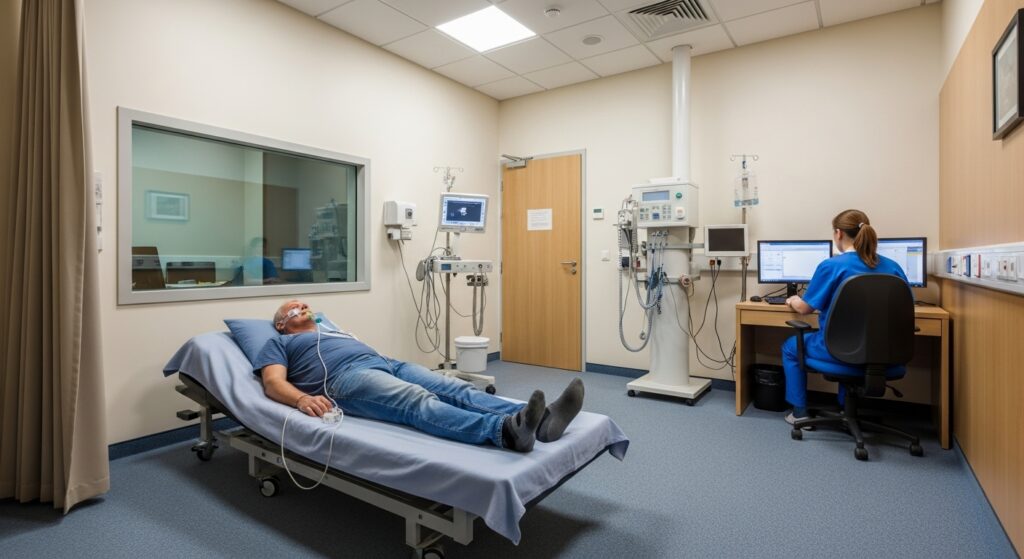
Understanding the Role of a Sleep Study
A sleep study is one of the most effective tools for accurately diagnosing sleep disorders. By monitoring various body functions during sleep, specialists can identify issues that may not be apparent through observation alone. Whether performed as an in‑lab sleep study or a home sleep apnea test, this evaluation provides the detailed insights necessary for proper treatment.
Sleep disorders such as obstructive sleep apnea, insomnia, restless legs syndrome, and narcolepsy often require more than a simple consultation. The data collected during a polysomnography helps doctors make a precise sleep disorder diagnosis and recommend an appropriate treatment plan.
In‑Lab Sleep Study vs. Home Sleep Apnea Test
There are two primary ways to conduct a sleep study—an in‑lab sleep study or a home sleep apnea test.
An in‑lab sleep study is typically conducted overnight at a sleep clinic. During this test, patients are monitored in a controlled environment where sensors record brain activity, breathing patterns, oxygen levels, heart rate, and muscle movements. This comprehensive approach is ideal for diagnosing a wide range of sleep disorders.
A home sleep apnea test is a more convenient option for patients suspected of having obstructive sleep apnea. This test allows patients to sleep in their own bed while wearing portable monitoring equipment. While not as detailed as an in‑lab study, it can still provide essential information for diagnosing moderate to severe sleep apnea.
What Polysomnography Measures
A polysomnography is a type of in‑lab sleep study that provides a complete analysis of sleep patterns and physiological responses. It measures:
- Brain wave activity to track sleep stages
- Breathing rate and airflow to detect obstructions
- Oxygen saturation to assess breathing quality
- Heart rate and rhythm during sleep
- Muscle activity and limb movements
These measurements give specialists a comprehensive picture of a patient’s sleep health, leading to a more accurate sleep disorder diagnosis.
The Role of Sleep Clinics in Diagnosis and Treatment
A qualified sleep clinic plays a critical role in both diagnosing and managing sleep disorders. Sleep clinic services typically include the initial consultation, conducting the sleep study, interpreting results, and creating a personalized treatment plan.
The expertise of sleep specialists ensures that patients receive an accurate diagnosis and effective therapy—whether it’s CPAP treatment, oral appliance therapy, lifestyle adjustments, or other targeted interventions.
Why Accurate Diagnosis Matters
Without an accurate sleep disorder diagnosis, patients may struggle with ongoing symptoms such as fatigue, poor concentration, or even increased risk for serious health conditions. A sleep study ensures that the root cause is properly identified, allowing for treatment that addresses the specific disorder.
FAQ About Sleep Studies
1. What is a sleep study?
A sleep study is a test that records brain activity, breathing, and body functions during sleep to diagnose sleep disorders.
2. What is the difference between an in‑lab sleep study and a home sleep apnea test?
An in‑lab sleep study provides comprehensive testing in a controlled setting, while a home sleep apnea test is a more convenient option for diagnosing suspected sleep apnea at home.
3. What is polysomnography?
Polysomnography is a detailed in‑lab sleep test that measures brain waves, oxygen levels, heart rate, and more to provide a thorough sleep disorder diagnosis.
4. Why should I go to a sleep clinic?
A sleep clinic offers specialized services, accurate testing, and customized treatment plans tailored to each patient’s needs.
5. Do sleep clinic services include treatment?
Yes. Sleep clinic services include diagnosis, treatment recommendations, and follow‑up care to ensure long‑term success in managing sleep disorders.

